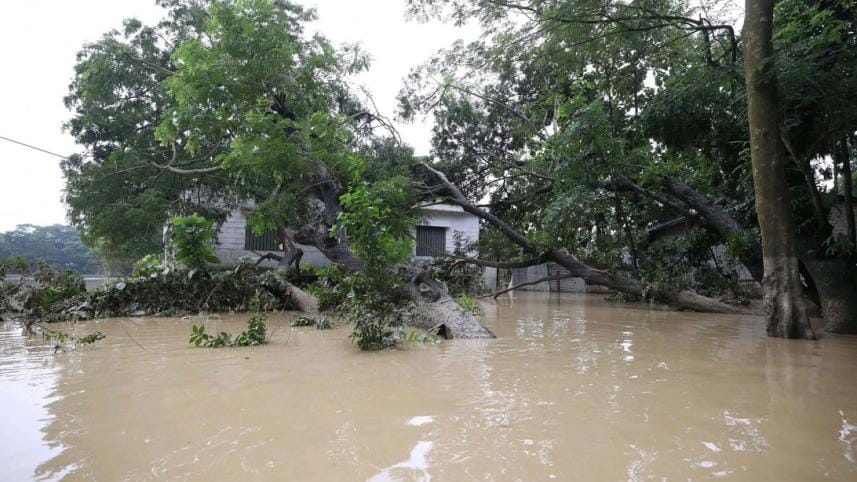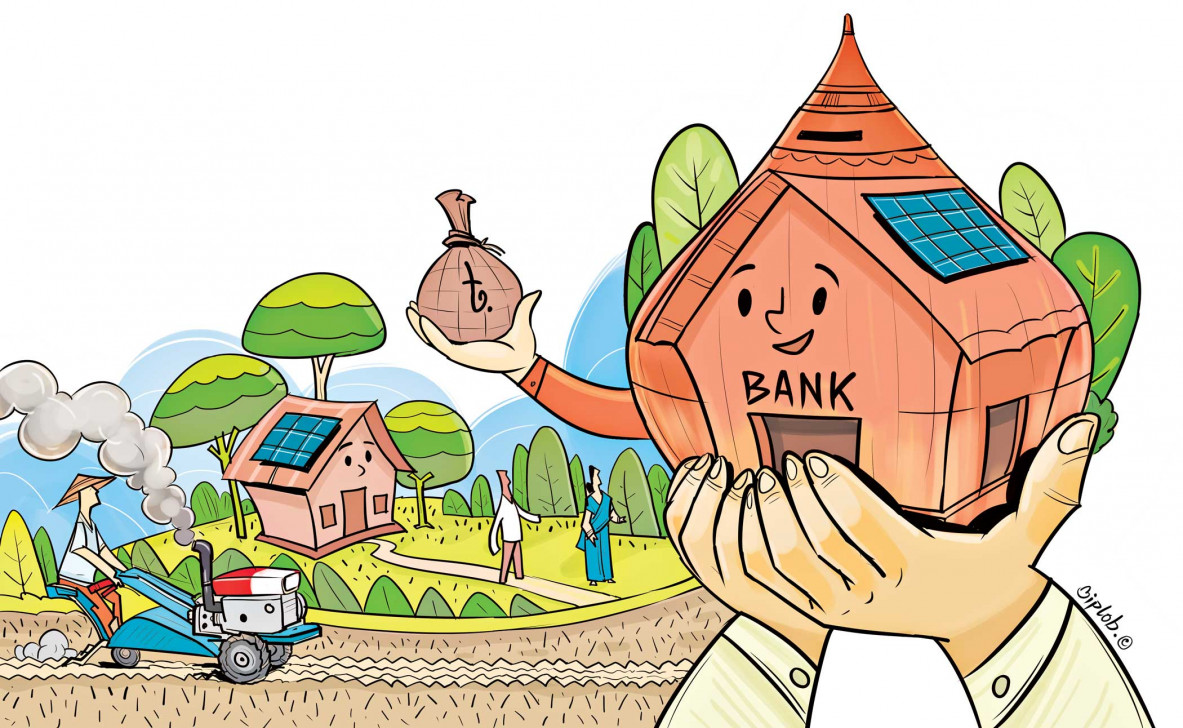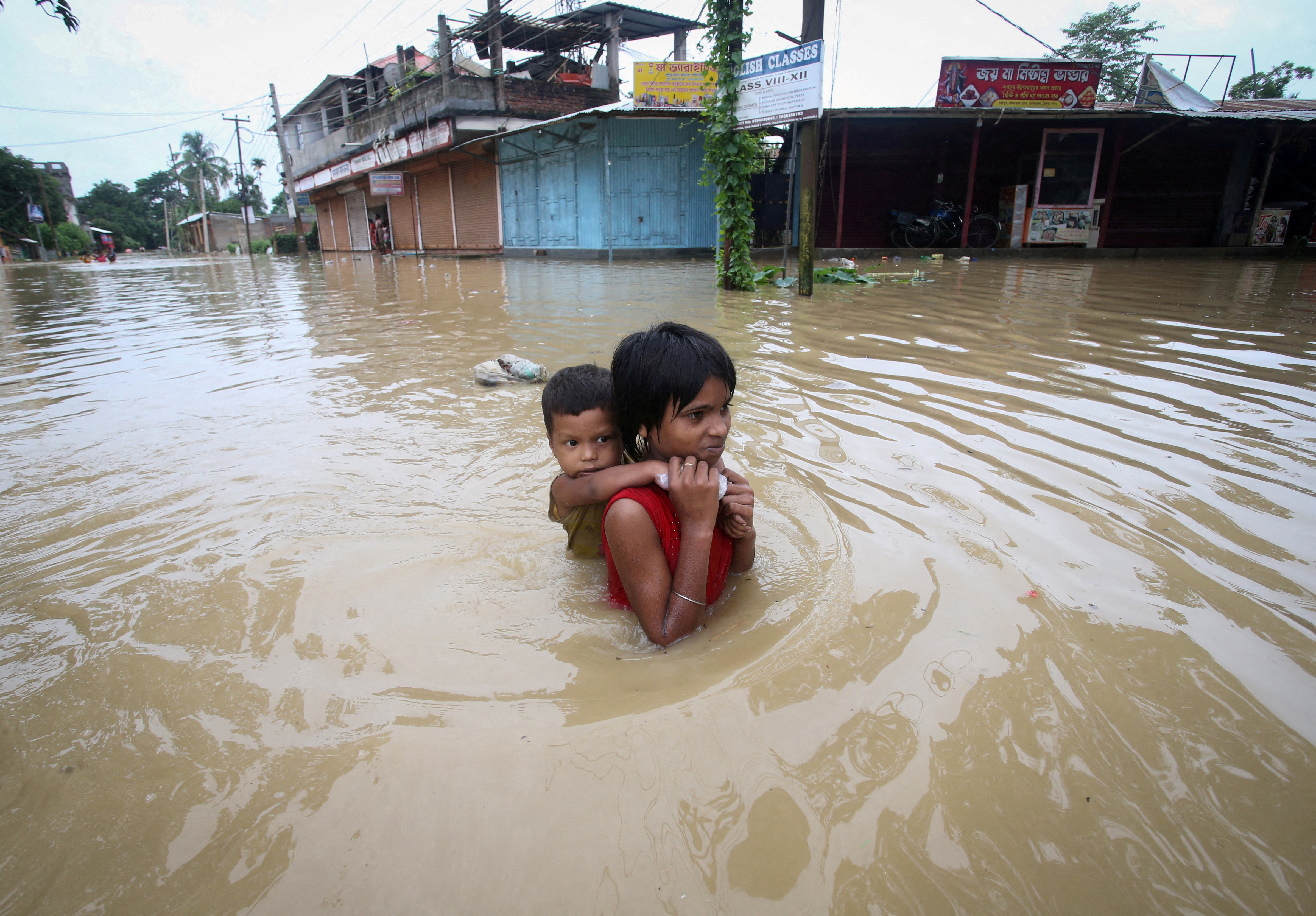Could debt cancellation finance Bangladesh’s climate actions?

Bangladesh is one of the most climate-vulnerable countries and is also facing a significant financing gap. It is also among the most indebted nations in the world. At the end of 2022, the country's foreign debt reached 20.2 percent of its GDP, compared to 17.8 percent at the end of 2018.
Bangladesh also faces challenges on multiple fronts. For one, the country is heavily at risk of climate hazards while having the least economic ability to fight them. It is largely dependent on foreign sources to support its climate actions, and the need for such finance keeps expanding with worsening climatic impacts. And while the country requires increased adaptation, most funding comes in the form of debt, the repayment of which cannot be ensured from adaptation activities. Moreover, debt for climate action adds to Bangladesh's external debt burden and affects the debt-servicing capacity of an already resource-constrained nation.
The concept of debt cancellation in the current climate discourse puts forward that a country may have its usual external debt cancelled by a lending party – be it another country or a multilateral agency – in return for a promise that the stipulated repayments would instead be utilised for climate actions. The Bangladesh government has already developed long-term plans to cope with climate impacts and achieve its nationally-determined contribution (NDC), addressing several Sustainable Development Goals as well. This includes the Eighth Five-Year Plan, the National Adaptation Plan (NAP), Bangladesh Delta Plan 2100, and Mujib Climate Prosperity Plan (MCPP). It is essential to source domestic and international financing for these plans.
Bangladesh's per capita external debt stood at $561.88 at the end of December 2022, with the total debt standing at $96.25 billion. Over the past five years, external debt has surged by about 62 percent, according to Bangladesh Bank. However, the debt-to-GDP ratio stood at about 30.6 percent at the end of 2022, which is lower than those of its South Asian neighbours and of many developed nations. While the staggering rise in this debt can be justified by massive development plans, Bangladesh needs to be careful about its over-reliance on external debt to drive development. Having more of this debt would signal complicated long-run implications for sovereign risk and credit rating, foreign exchange reserves, market stability, and reduction of financial flexibility.
Lower debt burdens will also help bring down financial and economic stress. Bangladesh is experiencing significant pressure on its forex reserves, and this can be relieved greatly through debt cancellation. Lending nations/agencies cancelling a debt means there will be no future repayments in foreign currency, which can save a significant amount of reserves. The foreign currencies saved can then be utilised for other purposes while improving the country's balance of payments. Against the cancelled repayments, the money can be used for climate adaptation and mitigation actions in the local currency, which is easier and more relaxing for the government.
According to the NDC and Delta Plan estimates, Bangladesh will require about $22.4 billion for climate mitigation purposes and $34.8 billion for adaptation purposes until 2030. Based on the World Bank's 2022 Country Climate and Development Report, implementing the NAP and conditional NDC combined, the total fund requirement up to 2030 stands at about $209.41 billion. While these plans offer quite comprehensive and complementary investment proposals, implementation is likely to be constrained by finance availability. The government already spends $1 billion a year (approximately six to seven percent of the national budget) on climate change adaptation, which is set to rise to $5 billion annually by 2050, according to World Bank estimates. The Development Assistance Committee (DAC) data of the Organisation for Economic Co-operation and Development (OECD) shows that developed countries committed about $23 billion for climate action between 2015 and 2021, of which 90 percent was in the form of debt instruments through bilateral and multilateral means. Out of the total, 65 percent was committed to adaptation activities. Comparing the DAC data with domestic funding mechanisms, it is observed that about 95 percent of our existing funding comes from international sources and is spent through budgetary mechanisms. These statistics show that Bangladesh heavily relies on overseas development assistance to meet its climate finance needs.
Reducing dependency on international climate financing requires innovation in financial instruments and mechanisms. The Heavily Indebted Poor Countries (HIPC) Initiative by the International Monetary Fund (IMF) and the World Bank launched a scheme to cancel the debts of some of the world's poorest countries. In 2015, the Paris Agreement included a provision for debt-climate swaps to cancel debts in return for commitments to invest in climate action. In 2020, the G20 announced a debt service suspension initiative (DSSI) to free up billions of dollars for climate finance in these countries. Hence, debt cancellation could be an important source for climate finance in Bangladesh. This would not only free up resources, but also help the country meet its commitments under the Paris Agreement and build a more climate-resilient future.
Lower debt burdens will also help bring down financial and economic stress. Bangladesh is experiencing significant pressure on its forex reserves, and this can be relieved greatly through debt cancellation. Lending nations/agencies cancelling a debt means there will be no future repayments in foreign currency, which can save a significant amount of reserves.
The foreign currencies saved can then be utilised for other purposes while improving the country's balance of payments. Against the cancelled repayments, the money can be used for climate adaptation and mitigation actions in the local currency, which is easier and more relaxing for the government. These resources would strengthen the government's actions on climate change and significantly help with implementing long-term plans such as the NAP and NDC. As debts are cancelled, Bangladesh's credit exposure to different lending agencies will come down, which will help the country receive newer financing to support its overall economic development needs.
Debt cancellation is useful for lending agencies, too, as it may help Bangladesh mobilise more funds for climate action (even if new and additional financing is down), thus improving the lenders' climate-financing scorecards and performance since the mainstream financing they made would now be used for climate action.
There are global examples where debt-climate swaps have worked well. For example, there is South Africa's restructuring of Eskom's debt in exchange for retirement from coal, and several debt-for-nature swaps taking place, such as in Barbados, Belize, and the Seychelles. However, several critical questions come up while considering and structuring such efforts. For example, how to choose which debt to cancel, and what are the criteria to select them? Will these be only debt of the government or its agencies, or the debt of the private sector, too? What specific commitments are to be made by the borrowing country in exchange for the cancellation? Who decides what these would be? Will the borrower and lender negotiate and settle directly, or would it be done via a special agency? Who will monitor the progress of the committed activities and what will happen in case of an under-delivery?
Bangladesh should consider and evaluate debt cancellation from all possible angles, addressing all pros and cons and formulating a comprehensive debt-cancellation policy. Any potential cancellation proposal should then be considered under the policy on a case-by-case basis. Ultimately, Bangladesh needs innovative climate financing mechanisms now more than ever before.
Dr Suborna Barua is professor at the Department of International Business in the University of Dhaka, and a financial analysis expert (climate finance consultant) at GIZ Bangladesh. He can be reached at sbarua@du.ac.bd.
Views expressed in this article are the author's own.
Follow The Daily Star Opinion on Facebook for the latest opinions, commentaries and analyses by experts and professionals. To contribute your article or letter to The Daily Star Opinion, see our guidelines for submission.




 For all latest news, follow The Daily Star's Google News channel.
For all latest news, follow The Daily Star's Google News channel. 



Comments